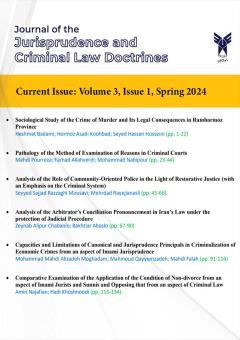The Right to Peace in Iran and Lebanon Law with a Focus on Western and Islamic Human Rights Precedent
Subject Areas : Jurisprudence and Criminal Law Doctrinesحیدر مطلب فائد 1 , احمد رضا سلیمان زاده 2 , حسین رستم زاد 3
1 - دانشجوی دکترای حقوق بین الملل، واحد مراغه، دانشگاه آزاد اسلامی، مراغه، ایران
2 - استادیار، گروه حقوق بین الملل، واحد ارومیه، دانشگاه آزاد اسلامی، ایران
3 - استادیار گروه حقوق، واحد تهران مرکز، دانشگاه آزاد اسلامی، تهران، ایران
Keywords: right to peace, human rights, Islamic human rights, right to peace in Lebanon law,
Abstract :
The need to live in peace and tranquility is the anxiety of every human being, for which the duty of its provision is the responsibility of the government. This research by analytical descriptive method, has surveyed and compared the right to peace in Iran and Lebanon Law. The Islamic Republic of Iran has adopted the precedent of Islamic human rights, which is depended on the doctrine of velayat al-faqih. But at the same time, the internal security of the country is facing problems that are considered as practical weaknesses. Strengthening of military and security forces, adoption of correct cultural policies in order to unite the country's ethnic groups and religions, centralization of power in governance, non-reliance on outsiders and political participation within the framework of religious authority have finally provided the four pillars of the right to peace for Iranian citizens. The Democratic Republic of Lebanon used western human rights only with the aim of ending internal wars and no explicit legislation was made regarding the right to peace. In the doctrine of Western human rights, compromise is recommended, which the Lebanese parties try to take as a model for forced compromise. The influence of foreigners through parties, lack of strengthening of security and military forces, caused many insecurities in this country, which has completely destroyed the security of the citizens and is still ongoing.
1. ابن اثیر جزری، مبارک بن محمد، (بی¬تا)، النـهایة في غریب الحدیـث و الأثر، قم، انتشارات اسماعیلیان.
2. ابن بابویه قمی، محمد بن علی، (1404ق)، من لایحضره الفقیه، قم، دفتر انتشارات اسلامی.
3. اردبیلی، احمد بن محمد، (بی¬تا)، زبدة البیان في أحکام القرآن، تهران، کتابفروشی جعفریه.
4. امینی نیا، عاطفه، (1388)، جایگاه حق بر صلح در منشور ملل متحد با نگاهی به عملکرد شورای امنیت، فصلنامه تحقیقات حقوق خصوصی و کیفری، شماره: 6 (1)، ص131-159.
5. ساعد وکیل، امیر، (1391)، حقوق بشر صلح و امنیت بین المللی، تهران، نشر میزان.
6. طلایی، فرهاد؛ پورسعید، فرزانه، (1392)، بررسی تأثیر متقابل حقوق بشر و صلح بر یکدیگر، دوفصلنامه بین المللی حقوق بشر، شماره: 8 (2)، ص85-122.
7. علیخانی، حمید، (1397)، صلح و امنیت بین الملل، تهران، قانون یار.
8. فلسفی، هدایت الله، (1379)، حق صلح و منزلت انسانی، تأملاتی در مفاهیم قاعده حقوقی، ارزش اخلاقی و بشریت، مجله حقوقی بین المللی، شماره: 19 (26)، ص5-130.
9. گروتیوس، هوگو، (1395)، حقوق ملل و نکاتی اساسی در باب حکومت و سیاست، ترجمه: حسین پیران، تهران، شهر دانش
10. مسائلی، محمود؛ ارفعی، عالیه، (1373)، جنگ و صلح از دیدگاه حقوق و روابط بین الملل، تهران، وزارت امور خارجه.
11. Avellaneda Hernández, S. L & Pardo Morcote, S. M, (2020), Educating for peace: a study from the rural educational institutions of the Sarna Páramo in Boyacá, Colombia.
12. Cofone, I & Turriago Betancourt, C, (2020), The Right to be Forgotten in Peace Processes. The Right to be Forgotten: A Canadian and Comparative Perspective (Routledge: London, 2020), 76-102.
13. Dastafkan, R, Salehi, H, & Hooshmand, M. M, (2020), Provision of Peace and Right to Health through Sanctions: Threats and Opportunities. Archives of Iranian medicine, 23(4Suppl1), S43-S48.
14. Dauda, K. O, (2020), Islamphobia and Religious Intolerance: Threats to Global Peace and Harmonious Co-Existence. Qudus International Journal of Islamic Studies (QIJIS) Volume, 8, 257-292.
15. Fried, A, & Harris, D. B, (2021), Chapter Seven. Making Peace with Government. In: At War with Government (pp. 197-218). Columbia University Press.
16. Halperin, E, & Schori‐Eyal, N, (2020), Towards a new framework of personalized psychological interventions to improve intergroup relations and promote peace. Social and personality psychology compass, 14(5), 255-270.
17. Hosseini, S. M, Hajizadeh, M, & Firozabadian, M. A. H. D. I, (2021), the capacities of Arbaeen pilgrimage as an Islamic human right at peace building. Jornal of Eslamic Human Rights, 9(2), 275-292.
18. Kotob, M, & Antippa, V, (2020), Peace Education: A Case Study of a Montessori School in Lebanon. Millennium Journal of Humanities and Social Sciences, 44-68.
19. McLaurin, R. D, (2020), Peace in Lebanon. In Middle East Peace Plans (pp. 159-207). Routledge.
20. Oviedo, Á. M. B, (2021), Weaponizing Gender: The Campaign Against ‘Gender Ideology’in the Colombian Peace Plebiscite (Doctoral dissertation, University of Delaware).
21. Sandoval, C, Cruz, M, & Ruiz Segovia, C, (2020), Victims’ participation in times of Covid-19 in transitional justice accountability mechanisms: what is needed for virtual hearings to fulfil this right? The case of Colombia and the special jurisdiction for peace.
22. Zeigler-Hill, V., Besser, A., & Andrews, D. (2021). The social worldviews of Israelis and attitudes toward peace with the Palestinians: The mediating roles of ideological attitudes and perceptions of threat. Peace and Conflict: Journal of Peace Psychology, 27(3), 393.
اساسنامه سپاه پاسداران انقلاب اسلامی، مصوب 1361.
اعلامیه حقوق بشر، مصوب 1948.
قانون اساسی جمهوری اسلامی ایران، مصوب 1358، بازنگری شده در سال 1368.
قانون اساسی جمهوری دموکراتیک لبنان، مصوب 1990.
قانون تأسیس وزارت اطلاعات جمهوری اسلامی، مصوب 1362.
قانون نیروی انتظامی جمهوری اسلامی ایران، مصوب 1369.


